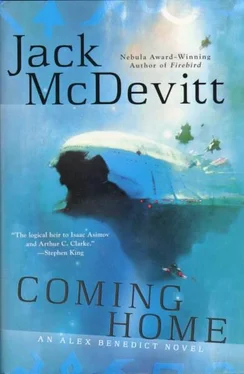“Something else,” said Alex. “About the internet failure.” Terrorist attacks had gradually disrupted it and eventually took it down worldwide. It was one of the causes of the Dark Age. Some historians think it was the prime cause.
“They lost almost everything,” he continued. “I’m talking about books now. A lot of the minor stuff, administrative records and avatars and medical data and whatnot, stuff that was maintained on local data nets, survived. But they lost pretty much every book that didn’t exist as a print copy somewhere. And print copies don’t have a good survival record over time. Anyhow, Zorbas set up a team to rescue whatever books they could. Foxworth has put together a long list of titles that he credits Zorbas with saving.”
The list appeared on my auxiliary screen. It included Cicero and several Greek and Roman plays, Chaucer, Rabelais, two Dickens novels, and three of the six surviving Shakespearean plays. And a book that one of my high-school teachers had used, she’d said, with the hope that it would create a passion for reading: Ray Bradbury’s Martian Chronicles . I remember how disappointed I’d been later when I learned the Martian canals had been pure fantasy.
There were probably two hundred titles in all. They weren’t all classics, but the mere fact that they’d survived gave them considerable value.
“Zorbas,” I said, “must have been one hell of a guy.”
“Yeah. He was. But I suspect he’d be unhappy if he knew how things have turned out with the museum artifacts.”
“Have you had any luck locating Madeleine O’Rourke?” The woman who’d pretended to be The Plains Drifter reporter.
“No. She’s done a decent job of keeping out of sight.”
“Pity. She might be the key to this business.”
“My thought exactly.” He paused. “What are you going to do about Khaled?”
“What do you mean?”
“Well, you know we’ll be going back to Earth when this business with the Capella is over.”
“Actually, I didn’t know that. Why will we be going back to Earth?”
“Because we haven’t found the artifacts yet.”
“Oh. Does that mean you know where to look?”
“Not yet. But we’ll find out.”
“How will we do that?”
“I’m not sure yet. But Baylee figured it out.”
“Maybe we’re not as smart as he was.”
“Maybe not. Chase, are you still not moving?”
“That is correct. I’m sitting in a basement.”
“Well, enjoy.” He paused. “Listen, keep me informed, okay? And if by any chance you get seriously lucky and have Gabe among your passengers on the way back, let me know. I’d want to be there when you come in.”
* * *
I waited almost half an hour before clearance came. Then doors opened, and we passed through into the docking area and out through another set of doors into the night. Belle set course, and, finally, we were on our way.
I made my jump, divided my time between reading and sleeping, and eventually surfaced just outside the target zone. At least that was Belle’s best estimate.
Belle worked to get an angle on our position while I checked in with the Dauntless . When I’d finished, she informed me we’d need thirty-six hours to arrive on station. “Find a good book,” she said.
We had some material about Baylee in the library, and I settled in with it. There were a couple of histories that had information on his assorted treks around terrestrial archeological sites. I sat looking at pictures of him standing with a spade in one hand at an Egyptian dig site, directing excavations at Chicago, examining ancient English inscriptions on a building in the American Southwest, talking with locals near Roman ruins. There were pictures of him and his team working at the Broomar site on Mars. And investigating an early space station orbiting Jupiter.
Lawrence Southwick had obviously spent more time with him than I realized. He was in many of the photos. And there was somebody else. In a picture from the Nevada desert, near the Phoenix ruins, a young woman stood between Baylee and Southwick. A fedora was pulled down to block off the sun. It was hard to make out her face. But I knew her.
“Who is it?” asked Belle.
“It’s Madeleine O’Rourke.”
“The reporter?”
The caption identified her as Heli Tokata.
Enjoy your time with a friend. You will not have him forever.
—Elizabeth Stiles,
Singing in the Void, 1221
I sent a message to Alex suggesting he run a search on Heli Tokata and informing him where I’d seen her picture. A response came back within a few hours. “Thanks,” he said. “It’s her . I can’t believe I missed it.”
And finally we arrived in the search area. The Capella was due in a little over four days. I informed the Dauntless that we were on station and checked in with the squadron commanders who were assigned to me. Six were there; four were presumably still en route.
There was no sign of movement in the sky, of course. We were too far from each other to see anything with the naked eye. I invested my time by going back over Alex’s research material. He’d added not only a few books to Belle’s library but also probably a thousand essays, reports, journals, and diaries. Belle offered to help, but Alex had already put her through the more obvious searches. I didn’t see any familiar names among the authors, so I picked a book titled Golden Vistas . It was a history written by Marcia Hadron. She was a contemporary, living on Toxicon. The fact that I wasn’t familiar with her name shouldn’t be interpreted as implying that she was an obscure voice in the field. To begin with, despite my job, I’m not nearly as well-read as I should be. Hadron had won several major prizes for her research.
The title referred to archeological missions aimed at recovering artifacts from the early space age. The Golden Age . Baylee got an entire chapter. But Hadron barely mentioned the Prairie House or Dmitri Zorbas. Nevertheless, I read through the chapter, and in the process found my respect for Baylee continuing to grow. He was described as a man who inspired others, who accomplished a great deal during his career, but who consistently gave the credit to his colleagues. “They loved him,” Hadron says. “He was remarkably selfless in a profession that traditionally attracted giant egos.”
“You know,” I told Belle, “you tend to hear the same thing about physicists, writers, lawyers, and actors. You never hear it said about physicians, though.”
“Maybe,” Belle said, “it’s because physicians are in a position to inflict serious damage on a patient who criticizes them.”
Baylee was mentioned a few times elsewhere in the book, but I couldn’t find anything relating to the hunt for the Apollo artifacts other than the author’s regret that they had never been recovered. Hadron dismissed the Dakota “myth,” as she called it. The artifacts, she believed, had almost certainly been taken out of Huntsville by thieves.
“I have something you might be interested in,” said Belle. “It does not relate to the artifacts, but it is nevertheless intriguing.”
“What is that?” I asked.
“It’s from a doctoral dissertation by a young woman who cites Luciana Moretti as her source. Apparently Baylee and Southwick did an excavation at Tyuratam.”
“Where?”
Читать дальше












